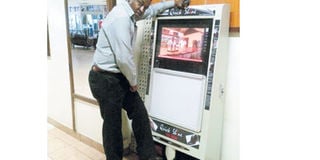Startup shoeshine business goes online to tap advertising revenue

Mbali Mbali Communications proprietor Kinyua Gichui demonstrates how an online shoe shinner works. PHOTO | COURTESY
What you need to know:
- Mr Gichuhi has convinced several corporate giants to advertise their products on the contraption — digitally — where there will be maximum exposure because shoe polishing takes three minutes per person.
- He got some advertisers on board, but things started going wrong as the posters would sometimes get stuck when the machine broke down.
Imagine a world where shoeshining is digital. Yes, you heard right. No human working on your shoes hurriedly in order to serve the next person in the queue.
Mr Kinyua Gichuhi has done just that. He has introduced digital shoe shiners in the market. Presently, they are in 10 locations in Nairobi, but he hopes to expand to the counties.
Mr Gichuhi has pumped over Sh4 million into the venture, which he relaunched early this year. The entity fizzled out after its initial launch in 2007 due to what he terms “wrong business footing”.
Advertising
This time round, Mr Gichuhi is happy as his hustle is paying off. This is because his business model is marketing and advertising, and not simply shoeshining.
You see, the digital shoe-shiner is a large contraption that accepts Sh10 coins through a slot. The machine, placed strategically on the lower end of the stand, brushes and rolls systematically as you position your shoe.
At the moment, the technology only works for black and brown leather shoes. Suedes can get an ugly smudge of paint on their soft surface.
Mr Gichuhi has convinced several corporate giants to advertise their products on the contraption — digitally — where there will be maximum exposure because shoe polishing takes three minutes per person.
It has taken Mbali Mbali Communications — formally registered in 2010 — innovation to competitively stamp its presence in a cut-throat environment.
“We aim to introduce marketing and communication concepts that are unique. Concepts that leave a lasting impression on the target audience and guarantee a wow effect,” Mr Gichuhi, whose journey to self-employment started in Uganda at Hotel Africana, says.
In 2005, Mr Gichuhi was attending a Marketing Africa event when he chanced upon an “analogue” shoeshine contraption.
The shoeshiner had a mechanism to run advertisements. He found the idea fascinating and decided to bring the business to Kenya.
In November 2007, after saving for it, Mr Gichuhi imported the machine and partnered with a colleague to run posters to be used on the contraption.
Hitches
“Challenges set in, like how to operate the machine, loading ads, the right operating conditions, and on and on. It was a headache,” he adds.
He got some advertisers on board, but things started going wrong as the posters would sometimes get stuck when the machine broke down.
He imported other machines and secured operating sites at the Kenyatta International Convention Centre, 680 Hotel, Galleria Mall, K1 Klubhouse, and Green House Mall. However, the glitches continued, affecting his advertisers’ confidence.
“When payments are due, it becomes a challenge to convince them to pay when they are pretty sure that their ad did not run as promised,” he notes.
After two years, Mr Gichuhi closed shop and went back to the drawing board. He asked himself what he had done wrong, what he could do to run an effective firm, and how he could regain clients’ trust. He had many sleepless nights over such questions.
Digital shoe box
He did some research and found a digital shoe box where advertisements could run from a laptop. It cost Sh340,000.
He teamed up with a friend who is experienced in digital advertising, then installed the relevant software in order to post the adverts via the internet.
“This reduced our operation costs as we no longer printed the posters that had to be physically added or removed to the spindle,” said Mr Gichuhi.





